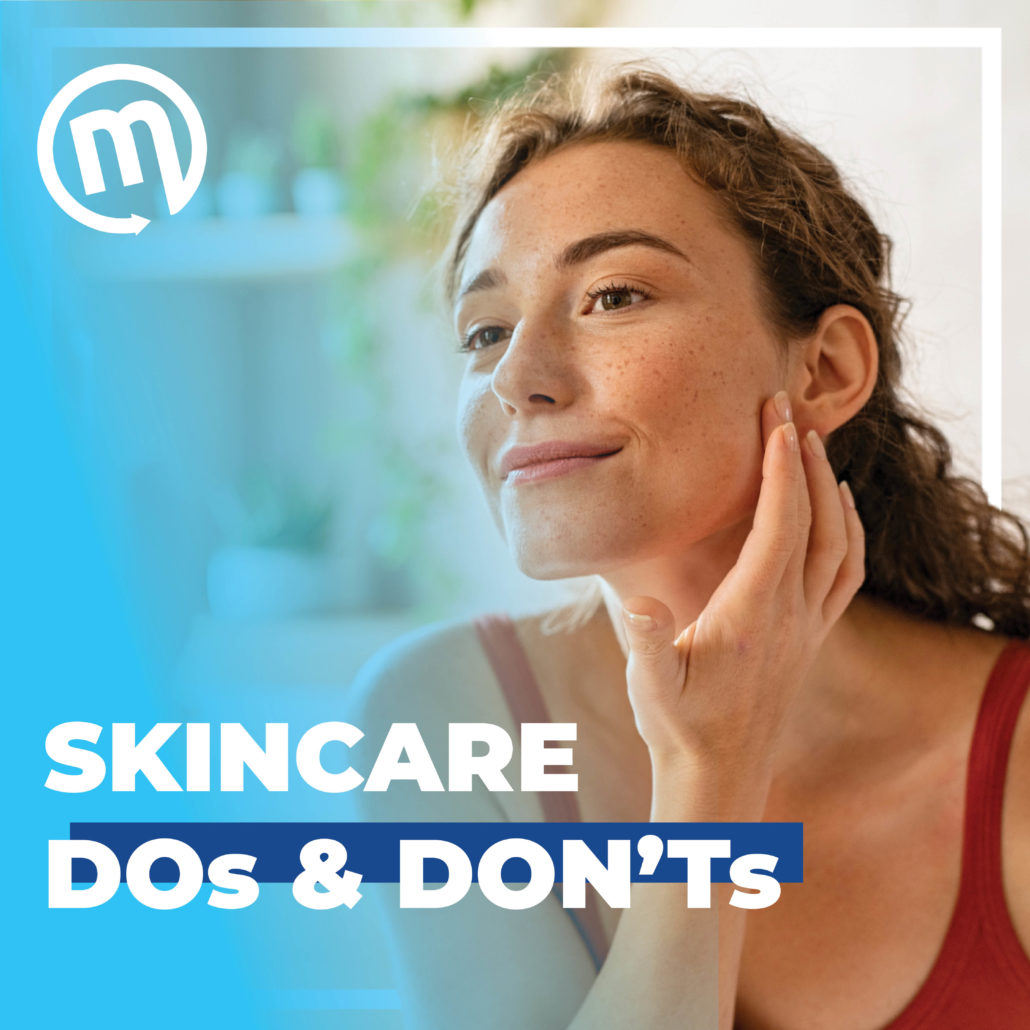By MotivHealth

Healthy Skin Month
November is National Healthy Skin Month. Healthy skin is essential because the skin is your body’s largest organ, and it protects all your internal organs. Skincare has been at the forefront of the beauty industry for several years now, which is a step in the right direction, but also leads to countless skincare misconceptions. There are millions of skincare products on the market right now, but not all of them are beneficial. In fact, some skincare products are downright harmful. The information below is sourced from real dermatologists, not money-grubbing beauty industry executives.
Dos & Don’t’s
Dr. Ranella Hirsch sorts basic skincare products into “need,” “nice,” and “never:”
Need:
- Cleanser
- Moisturizer
- Sunscreen (Sunscreen is non-negotiable for long-term healthy skin. It should be worn daily, even during the wintertime. To learn more about the importance of sunscreen, click here.)
- Active (Retinol or Serum)
Nice:
- Antioxidants
- Eye cream
- Gentle exfoliant
- Peptides
- Spot treatment
Never:
- Aggressive exfoliants
- Cellulite/stretch mark creams
- Cleansing Tools (such as facial brushes)
- Pore vacuums
Dr. Muneeb Shah points out beauty industry gimmicks:
- Products that claim to be “natural” can still be harmful. “Natural” doesn’t necessarily mean good, and “chemical” doesn’t necessarily mean bad. Many chemicals found in dermatologist-recommended products have been carefully researched and created in labs to benefit your skin.
- Be wary of the word, “hypoallergenic” as it is an unregulated term (meaning it can be printed on products without certification or evidence to back it up).
- “Unscented” does not always mean “fragrance free.” Choose products that explicitly say “fragrance free” instead.
Dr. Shah also advises against the following bad habits:
- Don’t exfoliate more than twice a week.
- Don’t shower with very hot water.
- Don’t use makeup wipes to clean off eye makeup.
- Don’t use essential oils on your skin.
Healthy Skin Starts Within
Skin health isn’t completely determined by topical products. Healthy skin starts on the inside—it’s vital to eat a balanced diet and get regular exercise.
Dr. Mamina Turegano presents a list of foods to promote healthy skin:
- Berries
- Leafy greens
- Bell peppers
- Sweet potatoes
- Broccoli
- Tomatoes
- Carrots
- Cabbage
- Beans
- Pomegranates
- Avocados
- Sardines
- Walnuts
- Salmon
- Mackerel
- Flax Seeds
- Artichoke
- Legumes
- Onion
- Garlic
- Oats
- Asparagus
- Bananas
For healthy recipes and workout tips, visit motivhealth.com/motivmagazine.
Dermatologist-Recommended Products
Cleanser
- The Ordinary Squalane Cleanser
- Cetaphil Gentle Skin Cleanser
- Dove Sensitive Skin beaty Bar
Moisturizer
- Vanicream Lotion
- CeraVe Moisturizing Cream
- Cetaphil Moisturizing Cream
Serums
- Olay Regenerist
- Renée Rouleau Skin Correcting Serum
- iS Clinical Youth Serum
Eye Creams
- RoC Skincare Retinol Correction Eye Cream
- Ole Henriksen Banana Bright Eye Cream
- BeautyStat Universal C Eye Perfector
Vitamin C
- TruSkin Vitamin C Serum
- L’Oréal Skincare Revitalift Derm Intensives 10% Vitamin C Serum
- Paula’s Choice Super Antioxidant Concentrate Serum
Retinoids
(It is important to start small with retinoids. Use only a pea-sized amount, and only apply to your face every other or every two nights when you first start. It’s important to apply it only at nighttime because it increases UV sensitivity. It’s also crucial to apply sunscreen to your face the next morning!)
- First Aid Beauty Retinol Serum 0.25% Pure Concentrate
- Murad Skincare Retinol Youth Renewal Night Cream
Sunscreen
(To learn the difference between mineral and chemical sunscreens, click here.)
- CeraVe Hydrating Mineral Sunscreen SPF 30 Face Sheer Tint
- SkinCeuticals Physical Fusion UV Defense Sunscreen SPF 50
- La Roche-Posay Anthelios Tinted Mineral Ultra-Light Fluid Broad Spectrum SPF 50 Face Sunscreen
Perfect Skin Is a Myth
You can eat a perfect diet, exercise daily, use dermatologist-recommended skin products, and avoid bad skincare habits, but your skin will still have texture. Contrary to what you see on social media and in magazines, human skin simply isn’t perfect. Healthy skin habits are likely to improve your skin, but it’s important to remember that most photos you see online are edited and airbrushed. Skin texture will always show through makeup and that’s okay. Embrace your blemishes and skin texture as a sign that your skin is working hard to keep you alive. Healthy skin is beautiful skin—bumps and all.
What’s your skincare routine? Comment below.

No Comment